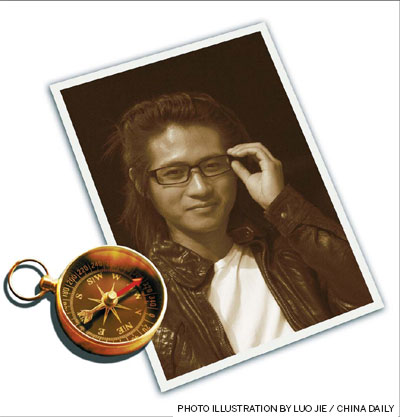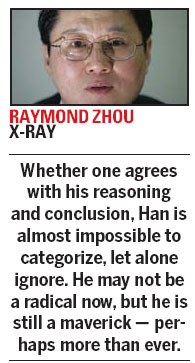Reformed revolutionary, or revolutionized reformist?
Updated: 2011-12-30 09:24
By Raymond Zhou (China Daily)
|
||||||||

The country's most followed free spirit vows to reform, claiming revolution is not for China.
Han Han is not a revolutionary but a reformist - politically speaking.
Arguably China's most influential person outside officialdom, Han took a political stance in three consecutive blog postings that first appeared on Dec 23, marking what some perceive as a departure from his trademark tirades against the establishment.
Using the very formal titles On Revolution, On Democracy and In Need of Freedom, the most popular blogger in the nation - with 517 million visits so far - gets into serious mode and allows only occasional bursts of his signature wit and sarcasm and a surprising absence of double entendres.
A wunderkind who established himself as a best-selling author at the tender age of 17, the Shanghai native, now 29, who considers himself more of a rural wild kid because he grew up - and still lives - in the far suburb of the metropolis, has developed three equally successful careers: racecar champion, novelist and essayist, who garners unprecedented attention through his online blog.
It is as an unconventional social commentator that he has firmly built up his reputation as the nation's prime opinion leader, all the while seeming to fly under the radar with his highly evocative language that flirts with, yet skirts, danger. In spite of translation impossibilities, some of that reputation has seeped overseas, with inevitable misunderstanding in the process.
Han's grip on the public imagination can be divided into style and substance - how he conveys himself, linguistically, or in terms of lifestyle, on his own generation; and what he wants to convey, which affects mature audiences more - usually politically minded intellectuals. Zhang Ming, a professor of Remin University of China, once said all professors in China combined cannot hold a candle to the reach of Han's influence.
Occasionally, people mistake his style for his substance. He himself seems to use it as a defense mechanism as well as a verbal art.
But we can also argue that Han's influence is refracted and magnified by all those professors who read and admire him, rather than the vast army of 20-somethings who retweet every word he utters but without getting its nuance.
Deeper thinking

Now, some of these intellectuals are disappointed that the youthful icon has sworn off revolution as China's way forward. It may amount to a sellout.
"A revolution needs an appeal, for which fight against corruption can be a good beginning but won't get very far," he writes.
A revolution needs a leader.
"A Chinese leader will not be a kind and merciful person whom one can conceive at the computer desk. Such a leader will most probably be a demagogue and dictator, selfish and imperious. We Chinese have a weakness for this kind of leadership style, which is the only one likely to succeed. This society is accustomed to good people losing and bad ones winning. Cultured youths may pin hope on a leader but he will be kicked out in a week. As the social elites depart from revolution, the structure will undergo changes. No matter how wonderful the initial slogans, everything will come down to money."
Han also brushes aside the so-called velvet revolution.
"Even if social problems are worse by tenfold and you have 10 Vaclav Havels delivering public speeches in 10 cities simultaneously - if it were allowed, all the speechifying will end up as advertising for throat lozenges."
Cynicism aside, he lists the likeliness that votes would be bought and the public that craves revolution will turn around once chaos rules and modern conveniences are interrupted.
"You'll hate me when you cannot get on your micro blog for three days."
The most striking remark is his interpretation of the Communist Party of China (CPC): "The CPC has 80 million members today, and that adds up to 300 million if relatives are included. It is no longer simply a party or a class. Its weaknesses are the people's weaknesses. When a party is too big and strong, it is virtually not a party but part of the people. So, the people equal the system. It's not what you do with the CPC. The CPC is a name only; the system is a name only. If you change the people, you change everything. So, the emphasis should be reform, and the fundamental thing is the rule of law, education and culture."
When Han faults "the majority of the Chinese people for remaining silent while others suffer and screaming only when misfortune befalls themselves", he evokes Lu Xun (1881-1936) who took a scalpel to the Chinese national character.
Han says his understanding of China's grassroots concerns is firsthand. He has visited hundreds of county-level cities in recent years for his rally racing career.
From his chats with ordinary people, he says he gets the feeling that "their pursuit of democracy and freedom is not as urgent as intellectuals make it out to be".
They hate corruption and the abuse of power not because they want to curb these malpractices but because they crave the privileges.
Only when they want to file complaints do they arm themselves with high-sounding words like justice and rule of law. Once they get fair compensation from the government, they go away happily.
"A social conflict that can be resolved with money is not really a conflict," Han argues.
He attributes the fantasy of a cross-class bond to the intellectuals who have enlarged their own concerns and appeals to the whole country.
However, he has seen hope in the next generation of the social underclass, so to speak, as he says.
"When I talked to their children, I found their vision had been more or less been opened up by the Internet and all kinds of media platforms. So, I'm not pessimistic."
By stating publicly that a one-person one-vote system is not China's priority, Han is fully aware that he will be accused as serving as a government mouthpiece.
"Have you been bought off by the government? Are you a 50-center?" he asked himself rhetorically, assuming the tone of his likely new opponents.
"In this society where one is either white or black, either right or wrong, either pro- or anti-establishment, revolution sounds crushingly high-minded but carries more harm if put into practice," he says, answering his own hypothetical questions.
However, Han does want something from the powers that be. For himself and his peers in art and media, he wants more latitude in creativity. He says the constraints from the old era no longer make sense because modern communications have rendered them obsolete.
"Cultural prosperity is the least costly thing as less constraints mean more prosperity."
Waves of backlash
"Han Han, you have not done your fair share of reading!"
This has become the refrain of his detractors, who obviously cannot reconcile the erstwhile critical spirit with his new moderate self. There are many who fault him for his "narrow" definition of revolution.
Others found fault with his "low quality of the common man" reasoning: "Was the United States high in its educational level when it adopted democracy?" they asked. "What about Taiwan?"
Some have delved into deeper analyses of the top-down and bottom-up approaches of change and their pros, cons and feasibilities in China.
At the root are two camps of feedback. On one side are his staunch supporters who regard him as the ultimate idol for his courage and wisdom. On the other side are the "gotcha" types, who cannot hide their schadenfreude that the maverick, who has been rising so inexorably in the last decade, has finally trespassed into unfamiliar territories and has faltered on the moral high ground.
Zhang Yiwu, a noted scholar from Peking University, contends Han's political view is not "innovative" but rather is shared by many in intelligentsia. What made it unique is the uncharacteristically methodical approach he took toward such issues of gravitas and the unparalleled impact he wields.
"Han Han displays a sophistication in understanding the complexity of Chinese society. It is not that today's Han is the opposite of yesterday's, but an elevation from intuition-induced journey of criticism to more rational thinking."
Chinese intellectuals have been caught in a tug of war between the right and left wings.
By throwing his weight behind social reform rather than outright revolution, Han has risen above the duality of politics, Zhang says. It is a difficult choice that has come to many in the pantheon of high intellect, who have been trying to grasp the reality of an ever-changing China.
A daily Chinese tabloid calls Han's views "a swing back" in a commentary, saying Han has increased his "depth and width of thinking after he has grown older and wiser and become a father".
While allowing that Han did not make alarming revelations in his essays, the writer says Han's words constitute a "breakthrough" because people of some renown had not dared utter them.
"China's field of opinion has long cultivated populism that is heavy on correctness."
Whether one agrees with his reasoning and conclusion, Han is almost impossible to categorize, let alone ignore. He may not be a radical now, but he is still a maverick - perhaps more than ever.
And it is rare in any society to maintain independence while everyone else is busy aligning themselves with various interest groups.











